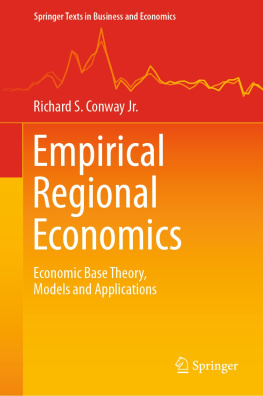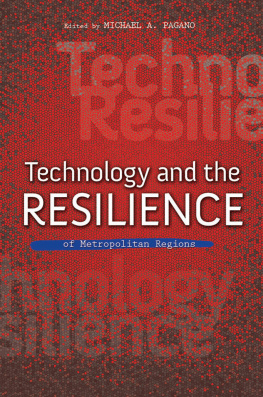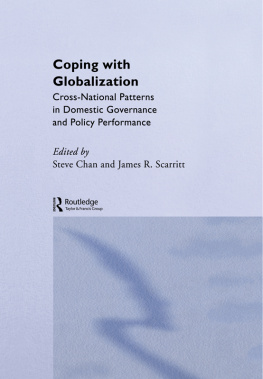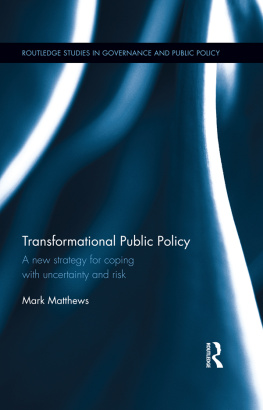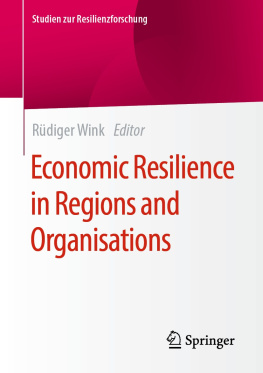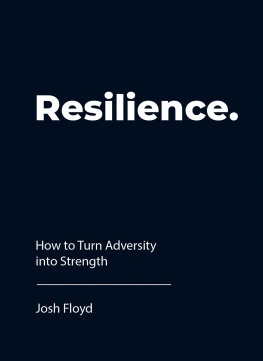Acknowledgments
On the title page, the authors are listed in reverse alphabetical order. Each of the authors made distinct and important contributions.
The authors would like to acknowledge and thank the following individuals who contributed to the writing of and research for this book: Patricia Atkins, Pamela Blumenthal, Diana Hincapie, Sarah Ficenec, and Rosa (Hung Kyong) Lee, all of whom were staff members of the George Washington Institute of Public Policy at The George Washington University; Alec Friedhoff, Alex Gold, Tara Kotagal, Howard Lempel, and Chad Shearer, all of whom were staff members at the Brookings Institution; and Kelly Kinahan and Fran Stewart who were at Cleveland State University.
The authors would also like to thank the MacArthur Foundation for providing funding for the research on this project through the Regional Resilience Program, which was administered by Margaret Weir through the University of California-Berkeley.
INTRODUCTION
Metropolitan economies sometimes experience economic adversity, with resulting serious impacts on the areas residents and institutions. The causes, nature, and length of these regional economic problems vary. Although the most visible adversity stems from natural disasters such as Hurricane Katrina in New Orleans or from man-made disasters such as the 9/11 terrorist attack in New York, they more commonly occur as a result of national economic downturns. These include those that affected Detroit during major recessions, the steady decline of a regions dominant export industry that affected Charlottes textile industry in the 1970s and 1980s, and national and international forces that erode the regions prior economic competitiveness, as seen in Cleveland, Detroit, and Hartford over the past three decades.
The question we address in this book is why some regions are resilient in the face of economic adversity, while others are not. In particular, we examine the role of public policy and intentional activity in achieving resiliency: what strategies and policies can regions pursue to help bring about economic resilience and long-term economic health and what are the implications for economic development policymakers and practitioners? Our analysis covers the period from 1978 to 2014. We separate out the Great Recession years and their aftermath (20072014) in order to assess the effect of this severe and prolonged shock on metropolitan area economic adversity and resilience.
Economic Adversity
We focus on two different, though not necessarily unrelated, forms of regional economic adversity: adverse effects from sudden shocks to the regional economy and long-term regional economic stagnation or chronic distress. Based on our findings, we argue that the determinants of both types of economic adversity and of resilience to it are, to at least some extent, predictable, and thus provide potentially important information to policymakers and practitioners about whether their region is at risk. We also argue that, in the short term, state, local, and regional economic development policy has relatively little impact on recovery from shocks once they have occurred, but can have an important effect on the potential for emerging from periods of chronic economic distress and for avoiding such periods altogether.
Economic shocks are exogenous events that have a sudden and immediate impact. They can be of various kinds and can be caused by a variety of factors, including national recessions that play out differentially on regional economies; sudden declines, either nationally or regionally in an export industry critical to a specific regions economy; the closure or relocation outside of the region of a major employer; natural disasters such as earthquakes, floods, or hurricanes; or other nonnatural disasters such as terrorist attacks, chemical spills, or nuclear plant accidents. (See chapter 1 for an operational definition of shocks.)
In contrast to a decline resulting from a sudden shock, a period of chronic economic distress is a long period of regional economic stagnation, slow growth, or decline. Chronic distress may be initiated by one or more of the kinds of sudden shocks described above from which the region is unable to recover, Chronic distress may be characterized by low but stable growth (relative to the national growth rate) for long periods of time or by periods of continually declining or even, though rarely, negative economic growth. (See chapter 2 for an operational definition of chronic economic distress.)
We argue that that the role of policy and intentional activity can best be understood through a lens that differentiates by level of government and by time period. It is important to separate the potential role of state and local policy from that of federal policy. The federal government has the ability to change interest rates, influence the value of the dollar, and run substantial budget deficits, all of which can have important impacts on national and regional economies in a relatively short period of time. However, none of these tools are available to state and local governments. Instead, for subnational governments, given the time it takes to put policies that are available to them in place and for these policies to have an effect, most actions will have little impact in the short term. This suggests that state and local policies, unlike potential federal actions, will have little if any role in responding to economic shocks, although the effect of these shocks can be cushioned through prior planning for a strong social safety net and budgetary rainy day funds. Despite the political difficulty in doing so, state and local governments can also cushion the impact of economic shocks by maintaining public spending and, if necessary, raising tax rates during an economic downturn rather than cutting spending to match reduced tax revenues.
In the longer term a regional economys ability to avoid or recover from chronic economic distress depends on its ability to adapt to changing circumstances and to develop or improve new products and services to replace those that have either died or were spun out through the operation of the product cycle. Here the most important actions involve investments in the formal education and workforce development systems and in infrastructure as well as efforts to diversify the regions export sector. However, it is also necessary to recognize that the strategic decisions and investments undertaken not by the public sector but by the regions existing firms play a critical role in shaping the condition of the regions economy. In the longer term, state and local economic development policymakers and practitioners have limited but important roles to play in attempting to mitigate market failures and to reduce transaction costs that limit the regions growth potential. This does not mean that we recommend that state and local leaders should sit tight and ride out an economic downturn. Instead we recommend that they take advantage of an economic crisis, when public support for change is presumably greater, to put in place public policies and investments that will improve the long-term functioning of regional economies.
Resilience
Resilience as an economic development concept has been well theorized but poorly understood in practical terms. The virtue of the term is that it builds a sense of process into ideas of economic strength and weaknessthat is, a healthy economy is not uniformly strong but is one that responds well to external or internal shocks and so recovers rather than collapses. The concept of



